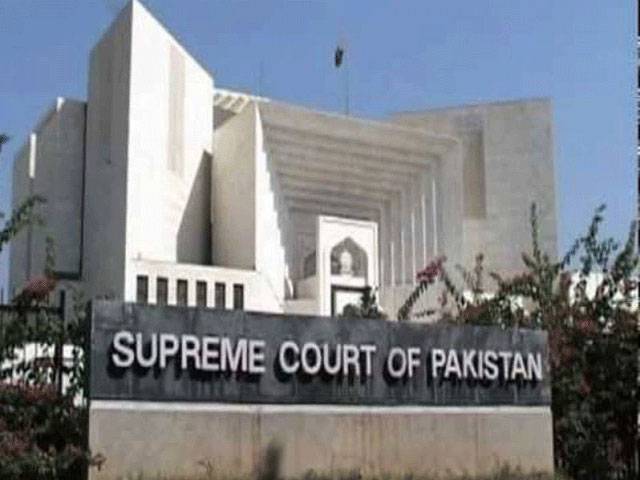ISLAMABAD - The Supreme Court on Tuesday again issued notice to former prime minister Nawaz Sharif in cases to determine whether disqualification under Article 62(1)(f) of the Constitution was perpetual or temporary.
A five-judge larger bench, headed by Chief Justice Mian Saqib Nisar, heard petitions on disqualification under Article 62(1)(f).
The bench appointed senior lawyers Munir A Malik and Barrister Ali Zafar as amicus curea (friend of court).
The court had issued a notice to former PM Nawaz Sharif and former PTI general secretary Jehangir Tareen, but no one appeared on behalf of Nawaz Sharif. Tareen, however, appeared in person.
The Supreme Court therefore issued a press release on Tuesday, which said: “It is notified for information of the general public that cases involving interpretation/determination of the question of temporary or permanent bar to contest elections after incurring of disqualification under any provision of the Constitution or the election laws have been fixed for hearing before five-judge bench of the Supreme Court of Pakistan at Islamabad. The hearing has commenced from today [Tuesday] at 9am.”
It further said: “Therefore if any person including any voter or member or leader of any political party who may consider it likely to be affected by the decision of the aforesaid cases in one way or another may approach the Supreme Court, if so advised in his own interest or in the public interest to seek permission to be heard in the matter.”
“This publication may be treated as court notice to all concerned for all intents and purposes, and if no one appears, the matter will be decided ex-parte. Whether they come or not [for the proceedings] is up to them," Justice Nisar added.
He, however, said they wanted to protect the rights of those whose rights were affected. Babar Awan, representing Samiullah Baloch, contended the disqualification under Article 62(1)(f) should be for life-time. He said there were three types of disqualifications.
First category of disqualification enumerated in sub-constitutional legislation like under the NAB law and ROPA.
Second is the constitutional disqualification, and the third category is the nature of allegations against a person convicted under the statutory law and that can be brought disqualification under the constitution.
During his arguments, Awan requested the chief justice to introduce him to ‘Baba Rehmatay’, a term used by Justice Saqib in his speech for himself, while addressing lawyers in Lahore.
The chief justice pointing at Babar Awan said, “Baba Rehmatay is your mother as she prays for you.” At that moment Justice Sh Azmat Saeed was seen smiling.
Babar Awan argued that under Article 62(d) of the Constitution violation of Islamic injunctions could result in disqualification and no punishment or declaration was required for it. He also said that a person was not qualified, if he had opposed the ideology of Pakistan.
Awan said that requirement for non-Muslim parliamentarian was that he should possess high moral reputation.
The chief justice questioned that those political parties who had opposed the creation of Pakistan whether its members would not qualify to become members of the parliament.
Awan replied that not after the creation of Pakistan but if they, for instance, say that the KP was a province of Afghanistan then that lawmaker would be considered disqualified.
The chief justice said they respected the parliament and considered it a supreme body.
He, however, said the parliamentarians were bound to follow the Constitution, adding the elected representatives must have high moral character.
The chief justice inquired whether the apex court could “read into the Constitution”.
Awan contended that the apex court could review but it could not change full stop or a comma in the Constitution.
He said seven judges of the Supreme Court in the 21st Amendment declared that they could not review Articles 62 and 63.
Awan requested the chief justice that the full court should hear the matter.
He said that the changes in the Constitution should be made through constitutional amendment.
The chief justice inquired from the counsel that he meant to say that Article 62(1)(f) of the Constitution was a unique provision.
He asked Awan that he meant to say that where in the constitution the time limit was not mentioned, it was for a life-time. Awan said that in case of the 18th Amendment deliberations continued for eight months.
After the preparation of 18th Amendment, the whole Constitution was evaluated by the entire parliament.
Justice Azmat observed that when the parliament had retained Article 62(1)(f) then it must have some significance.
The chief justice noted that the parliament after deliberations had retained the provision.
In his defence that the disqualification under 62(1)(f) was life-time, Awan submitted verses from Quran and quoted Hadith.
He clarified that he was not representing any political party, and his stance on Article 62 was his personal.
Awan said that child molestation, drugs smuggling, terrorism and money laundering and financial corruption were such crimes, for which disqualification should be for life-time.
Iftikhar Gilani advocate, appearing on behalf of an MPA from the KP, argued that clause “f” in Article 62 was incorporated during General Zia’s martial law regime.
He stated that seven amendments were made in the Constitution prior to the martial law but those were not in Articles 62 and 63.
Gilani contended that 1985 National Assembly was forced to incorporate clause (f) in Article 62.
Justice Azmat remarked that were the hands of the parliamentarians tied during the passage of the 18th Amendment. Why they retained this provision, he asked.
Justice Ijazul Ahsan said: “We [the apex court] do for the parliament, which it can’t do for itself.”
Justice Azmat asked whether the parliament did not have the courage to remove the provision.
The chief justice said they had to determine whether the disqualification under Article 62(1)(f) was temporary or permanent?
The case was adjourned till today.






